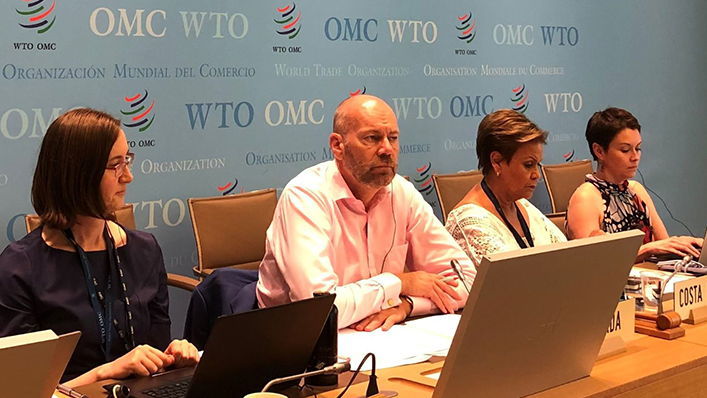
Canada and Costa Rica, the co-coordinators of the group comprising 74 members, sought suggestions at the meeting on the content and format of the December event, recalling that ministers agreed in a 14 December 2021 statement to identify concrete actions towards MC13 and to review progress before then. TESSD members have since established four informal working groups to focus on the following issues: trade-related climate measures, environmental goods and services, circular economy-circularity, and subsidies.
Facilitators of the four informal working groups provided at the meeting a summary of the discussions members held on 17-18 May. The facilitators’ reports are available here. They also indicated suggestions for work going forward and emerging ideas for year-end outcomes.
For the informal working group on trade-related climate measures, the facilitators suggested that the next meeting could delve deeper into the international context for carbon pricing, “carbon clubs” as well as carbon standards. They also suggested that members could work towards a compilation of best practices or guidelines regarding the design of trade-related environmental measures.
For environmental goods and services, the facilitators, based on members’ feedback, suggested that members continue the approach of focusing discussion around environmental objectives and the types of goods and services which are relevant to achieving those objectives. At the next meeting, discussions could cover a deep dive into the objective of climate mitigation and include an update on environmental services discussions. The United Kingdom presented research on non-tariff barriers, with a focus on product standards in the form of technical barriers to trade.
For the circular economy-circularity informal working group, facilitators suggested that after bringing in business perspectives at the last working group meeting, the next meeting could be used to explore trade policy aspects of the circular economy. They also suggested that members undertake a mapping exercise to gain a comprehensive understanding of the wide breadth of policy issues and priority sectors related to this issue.
For subsidies, facilitators indicated, based on members’ suggestions, that the next meeting could be used to widen the scope of discussions. Two possible areas that could be envisaged are the environmental effects of industrial subsidies and the trade effects of green subsidies.
Members engaged in a substantive discussion on the way forward in the four working groups, with a number of members providing additional suggestions. Several members requested that the Secretariat summarize 2022 TESSD discussions as part of the output expected at the end of the year.
At the start of the meeting, several members took the floor to express their strong opposition to the invasion of Ukraine. The Russian delegate responded by saying that the WTO was not the proper venue for a discussion of this nature.
The TESSD meeting on the second day featured presentations of regional experiences at the intersection of trade, climate, and sustainable development. Members heard reports from private sector, government, and other stakeholders in Africa, Asia-Pacific, as well as South and Central America and the Caribbean on challenges and opportunities for sustainable trade. Presentations can be accessed here.
The meeting was the last to be chaired by Ambassador Stephen De Boer of Canada and Ambassador Gloria Abraham Peralta of Costa Rica, whose terms in Geneva are coming to an end.
In closing the meeting, Ambassador Abraham thanked members for their commitment and for “moving forward and nurturing this initiative together in the midst of a pandemic, a war and a climate crisis. The stress test to which the multilateral system has been subjected is considerable, but as MC12 demonstrated, we came out ahead and obtained very relevant achievements in terms of sustainability.”
On the way forward, Ambassador Stephen De Boer of Canada said that “the environmental challenges that the world faces are great but I am more confident than ever that TESSD members will rise to the occasion and prove to the world that the WTO has a role to play in tacking these critical challenges.”
The next TESSD working group meetings are tentatively scheduled for early October.
Share
Reach us to explore global export and import deals